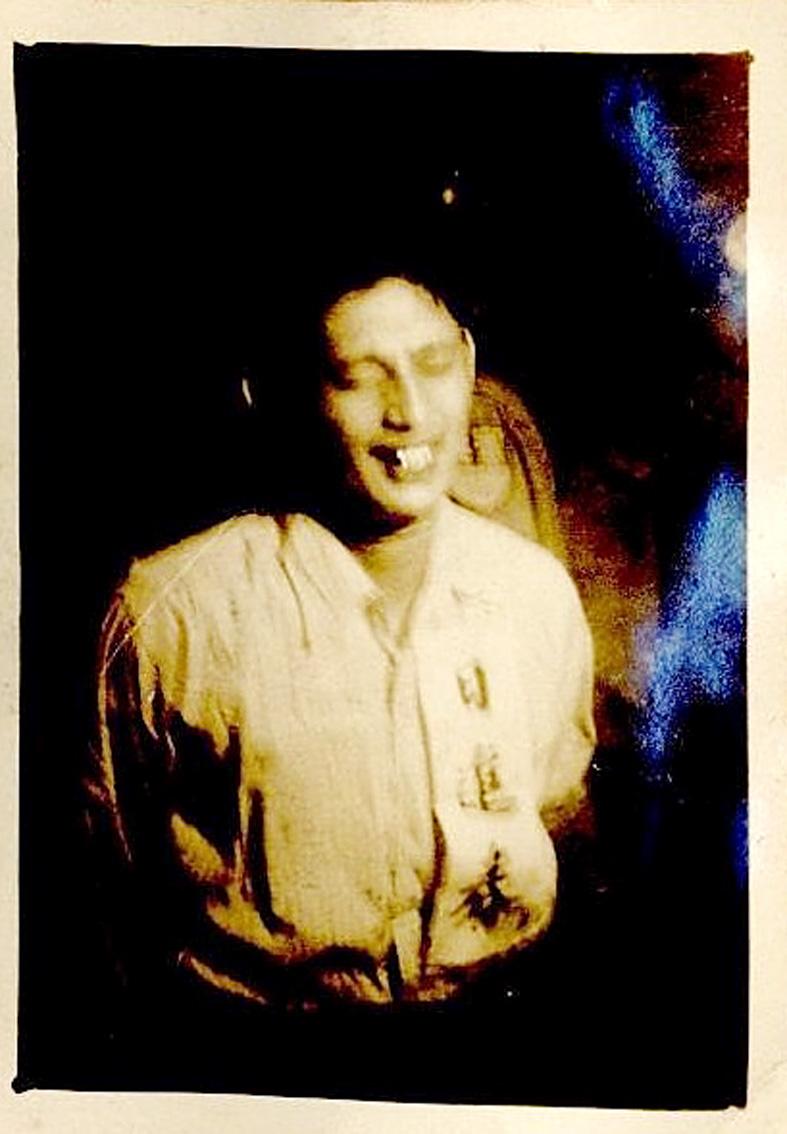Jih Chin-chun (日進春), a member of the Saisiyat community, was the first Taiwanese Aborigine to fall victim to the White Terror era when he was shot by Chinese Nationalist Party (KMT) military police at a riverbank in Taipei 69 years ago, the Transitional Justice Commission said yesterday.
Jih has been memorialized by a picture, in which he is shown laughing, captured just before he was executed on Aug. 29, 1952, the commission said.
The commission said that it has asked researchers to compile a booklet on transitional justice measures focusing on Taiwan’s Aborigines, including Jih, as well as stories of Paiwan youth Lai Hung-man (賴紅炎) and other Aboriginal victims of the period.

Photo courtesy of the Transitional Justice Commission
The commission said it hopes later generations of Aborigines can learn about the injustices their communities faced during the period.
Jih was shot five times, and his body was left on a pile of corpses in the Liuzhangli (六張犁) area of Taipei, forgotten until the present day, the commission said.
Jih’s father, Jih A-kuai (日阿拐), was the head of a Saisiyat community and went into hiding to avoid capture during a rebellion against the Japanese in 1902, in what is now Miaoli County’s Nanjhuang Township (南庄), it said.
Jih A-kuai died a year later in what now is Luchang Borough (鹿場) of Hsinchu County’s Jhubei City, it said.
Jih Chin-chun was detained after being involved in the case of Chang Yan-mei (張燕梅), it said. Chang was a teacher at Taipei’s Penglai Elementary School and a member of the Taipei Workers’ Committee, a group of Chinese Communist Party sympathizers planted within various government agencies.
Jih Chin-chun once gave Chang an autobiography, but he never participated in any committee meetings, the commission said.
Although he was able to avoid Jih Chin-chun’s fate, Lai had been wrongly accused of dissidence due to his random jottings while he was a student, in which he would raise questions about how to improve the futures of fellow Aborigines, it said.
He was eventually taken for questioning while he was teaching at Taitung’s Jialan Elementary School in 1965 and detained for several days, it said.
The White Terror era refers to the suppression of political dissidents including the 228 Incident, an uprising that began on Feb. 27, 1947, which was brutally suppressed by the then-KMT regime. The government subsequently imposed martial law, which was lifted on July 15, 1987.

The manufacture of the remaining 28 M1A2T Abrams tanks Taiwan purchased from the US has recently been completed, and they are expected to be delivered within the next one to two months, a source said yesterday. The Ministry of National Defense is arranging cargo ships to transport the tanks to Taiwan as soon as possible, said the source, who is familiar with the matter. The estimated arrival time ranges from late this month to early next month, the source said. The 28 Abrams tanks make up the third and final batch of a total of 108 tanks, valued at about NT$40.5 billion

Two Taiwanese prosecutors were questioned by Chinese security personnel at their hotel during a trip to China’s Henan Province this month, the Mainland Affairs Council (MAC) said yesterday. The officers had personal information on the prosecutors, including “when they were assigned to their posts, their work locations and job titles,” MAC Deputy Minister and spokesman Liang Wen-chieh (梁文傑) said. On top of asking about their agencies and positions, the officers also questioned the prosecutors about the Cross-Strait Joint Crime-Fighting and Judicial Mutual Assistance Agreement, a pact that serves as the framework for Taiwan-China cooperation on combating crime and providing judicial assistance, Liang

A group from the Taiwanese Designers in Australia association yesterday represented Taiwan at the Midsumma Pride March in Melbourne. The march, held in the St. Kilda suburb, is the city’s largest LGBTQIA+ parade and the flagship event of the annual Midsumma Festival. It attracted more than 45,000 spectators who supported the 400 groups and 10,000 marchers that participated this year, the association said. Taiwanese Designers said they organized a team to march for Taiwan this year, joining politicians, government agencies, professionals and community organizations in showing support for LGBTQIA+ people and diverse communities. As the first country in Asia to legalize same-sex

MOTIVES QUESTIONED The PLA considers Xi’s policies toward Taiwan to be driven by personal considerations rather than military assessment, the Epoch Times reports Chinese President Xi Jinping’s (習近平) latest purge of the Chinese People’s Liberation Army (PLA) leadership might have been prompted by the military’s opposition to plans of invading Taiwan, the Epoch Times said. The Chinese military opposes waging war against Taiwan by a large consensus, putting it at odds with Xi’s vision, the Falun Gong-affiliated daily said in a report on Thursday, citing anonymous sources with insight into the PLA’s inner workings. The opposition is not the opinion of a few generals, but a widely shared view among the PLA cadre, the Epoch Times cited them as saying. “Chinese forces know full well that